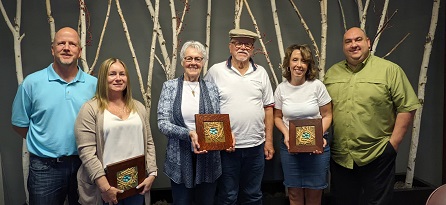Washtenaw County: Multiple Properties Conserved, Protects Water Quality within River Raisin Watershed

Manchester – Legacy Land Conservancy has permanently protected 90 acres of forest, prairie and wetlands, including 3,850 feet of frontage along the River Raisin, in western Washtenaw County.
In a unique joint effort of three different sets of landowners—John and Carol McCullough, Byron and Freida McCullough, and David and Jennifer Helmer—the McCullough-Helmer Project consists of three conservation easements in the Sharon Hills area of Manchester. The properties contain restored open prairie, multiple wetland areas and steep wooded slopes leading down to the River Raisin.
The landowners are extremely pleased to protect their properties’ highly invaluable natural wetland areas and ensure the quality and quantity of water resources within the River Raisin Watershed via conservation easements with Legacy, which offers permanent protection of privately-owned land.
The three families were inspired to collaborate and protect their properties in 2016 when they observed the establishment of the Washtenaw County Parks & Recreation Commission’s (WCPARC) River Raisin Preserve just up the river from their land.
“Seeing the nearby land preserved years ago motivated us to find a way to protect our land too,” landowner John McCullough said. “Thanks to Legacy, WCPARC, and their partners, our vision is now a reality and the land we love is protected forever.”
The McCullough-Helmer Project is partially funded by a Michigan Department of Environment, Great Lakes, & Energy (EGLE) Non-Point Source Pollution Grant—a grant that aims to restore waters impaired by Nonpoint Source (NPS) Pollution and protect high quality waters from degradation. NPS pollution is a leading cause of pollution in waterways. It is a combination of pollutants from a large area rather than from specific sources such as discharge pipes at industrial and sewage treatment plants. As water runoff caused by rainfall or snowmelt moves over and through the ground and accumulates contaminants from sources like gardens or parking lots, it is emptied into streams or rivers.

Permanent protection of the land within the McCullough-Helmer Project is an essential part of reducing NPS pollution. Its large swath of exceptional wildlife habitat, open space, riparian area and open river along the River Raisin helps ensure there is quality water filtration and ample flood plain to maintain a healthy river downstream through more urban areas, like Monroe, and contributes positively to the overall health of the River Raisin and Lake Erie.
“Land protection in the Upper River Raisin sub-watershed remains a high priority for the continued health of the larger watershed and Great Lakes Basin” explained EGLE watershed project manager Julia Kirkwood. “Keeping the forests intact and preserving the natural land cover ensures these lands will provide significant water quality benefits in downstream areas.”
The project also adds to existing protected lands in the Sharon Hills greenway area and along the River Raisin, building on river protection momentum and benefiting water quality in the corridor. Its 3,850 feet along the river joins the string of protected lands and 43,000 feet of protected river frontage from Sharonville State Game Area, to the Nan Weston Preserve, to Sharon Mills park, to the WCPARC River Raisin Preserve, and down to Legacy’s Mann easement and WCPARC’s Leonard Preserve.
Additional funds to purchase the conservation easement from the landowners were secured in partnership with WCPARC.
“Land protection is a group effort,” Legacy Executive Director Diana Kern said. “Legacy is fortunate to work with amazing landowners and partners in order to protect land and help safeguard clean water in the River Raisin Watershed and surrounding waterways.”
About Legacy Land Conservancy: Founded in 1971 as Michigan’s first local land trust, Legacy is a nonprofit conservation organization that protects land in southern Michigan. Legacy’s mission is to secure for current and future generations a land base for nature, agriculture, fresh water, and recreation in Jackson and Washtenaw counties and beyond. Legacy has helped to protect more than 9,000 acres of land (including seven nature preserves open for all to enjoy) that enhance our community’s quality of place by safeguarding water quality, conserving working farms, and protecting places to play. In a testament to 50 years of successful voluntary conservation, Legacy is accredited by the Land Trust Accreditation Commission for adhering to a set of standards designed to ensure the organization’s work will endure forever. Legacy is based in Ann Arbor, Michigan. For more information, visit www.legacylandconservancy.org.
About Michigan Department of Environment, Great Lakes, & Energy: Working side-by-side with partners at local, regional, state and federal levels, the Michigan Department of Environment, Great Lakes, and Energy (EGLE) safeguards our state’s environment while supporting the economic growth and development crucial for Michigan’s future.
Non-Point Source Pollution project: This NPS Pollution Control project has been funded wholly or in part through the Michigan Department of Environment, Great Lakes, and Energy’s Nonpoint Source Program by the United States Environmental Protection Agency under assistance agreement 2019-0018 to Legacy Land Conservancy for the Upper River Raisin Riparian Protection – Phase 4 project. The contents of the document do not necessarily reflect the views and policies of the United States Environmental Protection Agency or the Department of Environment, Great Lakes, and Energy, nor does the mention of trade names or commercial products constitute endorsement or recommendation for use.
About Washtenaw County Parks and Recreation Commission (WCPARC): WCPARC’s mission is to enhance the quality of life in the County by promoting a healthy lifestyle, efficiently providing high quality facilities and programs reflective of current and anticipated recreational needs of County residents and visitors—with particular emphasis on preserving fragile lands, water quality, wildlife habitat, creating pedestrian and greenway connections, and providing high quality services to those of all backgrounds. WCPARC manages Washtenaw County’s Natural Area Preservation Program (NAPP) which was established in 2000 by the Washtenaw County Board of Commissioners through an ordinance that provides procedures and standards for purchase and protection of natural areas and agricultural land by the County. In 2010, and again in 2020, voters chose to renew the county-wide millage that funds the program. For more information, visit https://www.washtenaw.org/939/Natural-Areas-Preservation-Program

























